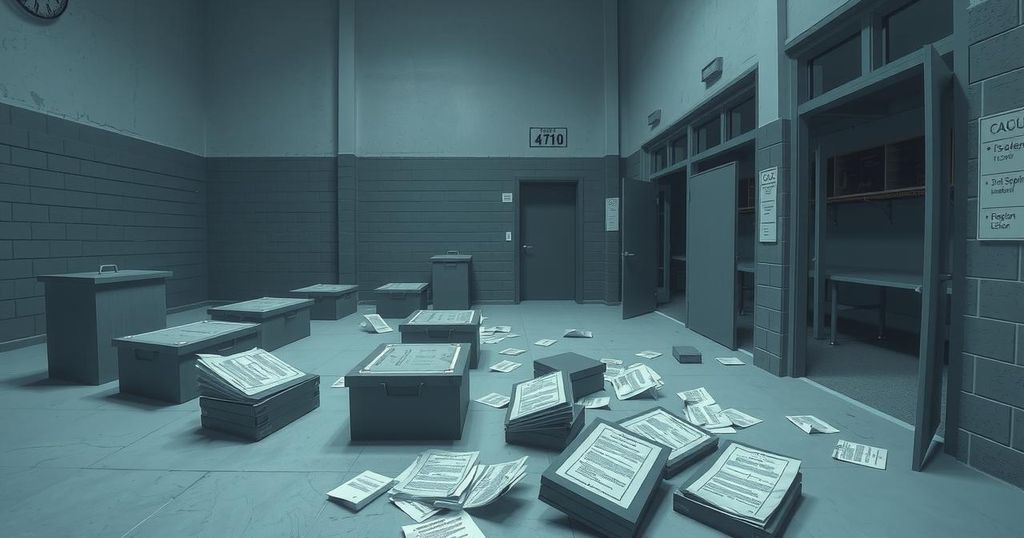Maduro’s Party Looks to Secure Victory Amidst Opposition Boycott in Venezuela

Venezuela’s elections face significant opposition boycotts, low voter turnout is anticipated, and Maduro’s party expects a strong win amid a crackdown on dissent. The political climate remains tense, with rising international concerns over the legitimacy of the electoral process as the economy struggles under sanctions.
The political landscape in Venezuela is fraught with tension as President Nicolás Maduro’s party anticipates a significant victory in Sunday’s legislative and regional elections. This optimism follows a series of arrests targeting opposition figures, notably those associated with María Corina Machado, who has spearheaded a prominent boycott campaign aimed at protesting Maduro’s controversial reelection in 2022.
Among those detained prior to the elections was Juan Pablo Guanipa, a key opposition member, arrested on accusations of orchestrating a “terrorist network” purportedly aimed at sabotaging the elections. Diosdado Cabello, the Interior Minister and a key figure in Maduro’s government, claimed Guanipa is connected to a group of 50 individuals seized earlier in the week, who are suspected of being mercenaries allegedly funded by foreign interests.
Tensions escalated ahead of the elections, with over 400,000 security agents mobilized to oversee the voting process. Approximately 21 million voters were eligible to select 285 National Assembly members and 24 governors, including those in Essequibo, a contested oil-rich area claimed by Venezuela but administered by Guyana.
Yet, the predicted voter turnout was dismal, with pollster Delphos estimating only around 16 percent participation. This low turnout reflects widespread disillusionment among voters, galvanised by the opposition’s call to abstain from what they deem is another fraudulent election.
Venezuelans have lost considerable faith in the electoral process following last July’s presidential election, where Maduro was declared the winner without transparent results. The opposition’s own findings from polling stations indicated a clear victory for Edmundo Gonzalez Urrutia, who has since sought refuge abroad. The brutal crackdown on protests following that election left 28 individuals dead and numerous others imprisoned, exacerbating Venezuela’s isolation on the global stage.
Machado openly condemned this weekend’s election as a “massive farce,” taking to social media to share images of mostly empty polling stations. Polls officially opened at 6:00 am, but by midday, only a few voters had shown up in major cities like Caracas, San Cristobal, and Barinas. Some voters expressed doubt, such as 78-year-old retired civil servant Candelaria Rojas Sierra, who remarked on her way to mass, “I am not going to vote because I voted in the presidential election, and they stole the elections. So it’s really a farce.”
On the flip side, a minor opposition faction led by Henrique Capriles, a two-time presidential candidate, diverged from the boycott strategy, asserting that abstinence merely solidifies Maduro’s hold on power. Capriles emphasized the need for participation, declaring voting an act of resistance against the regime. Following his arrest, a post from Guanipa’s account claimed that he had been “kidnapped” by Maduro’s forces but vowed to continue resisting the dictatorship.
As the election unfolds, it occurs against a backdrop of significant turmoil within Venezuela’s already struggling economy. Recent sanctions from the United States, including the revocation of permissions for Chevron to operate, threaten to cripple Maduro’s administration further. The U.S. has also revoked deportation protections for many Venezuelan migrants, escalating tensions further.
The stakes are notably high, particularly concerning the elections for the National Assembly and the governorship of Essequibo, a region that has been administered by Guyana for years but is claimed by Caracas. The international community will closely monitor the vote results amidst these complex dynamics.
In summary, Venezuela’s election is characterized by significant opposition boycotts and low voter turnout, amid government crackdowns on dissent. The anticipated victory of Maduro’s party signals ongoing challenges for the opposition and raises concerns over the legitimacy of the electoral process. Amidst this political turmoil, Venezuela’s economy remains under severe strain, particularly in light of recently imposed U.S. sanctions.
Original Source: www.bryantimes.com







